University Nursing: Group Work Reflection on Multidisciplinary Team
VerifiedAdded on 2023/05/30
|6
|1256
|357
Report
AI Summary
This report is a reflective analysis by a nursing student on their experience with group work centered on the principles and practices of a multidisciplinary team. The student, utilizing the Gibbs reflective cycle, details their involvement in a school presentation, describing the challenges of team dynamics, including conflicts, lack of coordination, and unequal participation. The report outlines the student's initial excitement, subsequent frustrations, and feelings of being stifled, followed by an evaluation of the experience, identifying issues such as a lack of collaborative effort, poor communication, and inadequate leadership. The analysis delves into the importance of organizational skills, collaboration, and time management, emphasizing the benefits of effective planning and decision-making in group activities. The conclusion underscores the importance of leadership, coordination, and decision-making in group work and proposes an action plan that includes enhancing leadership qualities, improving communication skills, and adopting a proactive approach to future group projects. The student aims to cultivate better interpersonal skills and a more patient, stress-tolerant approach to teamwork.
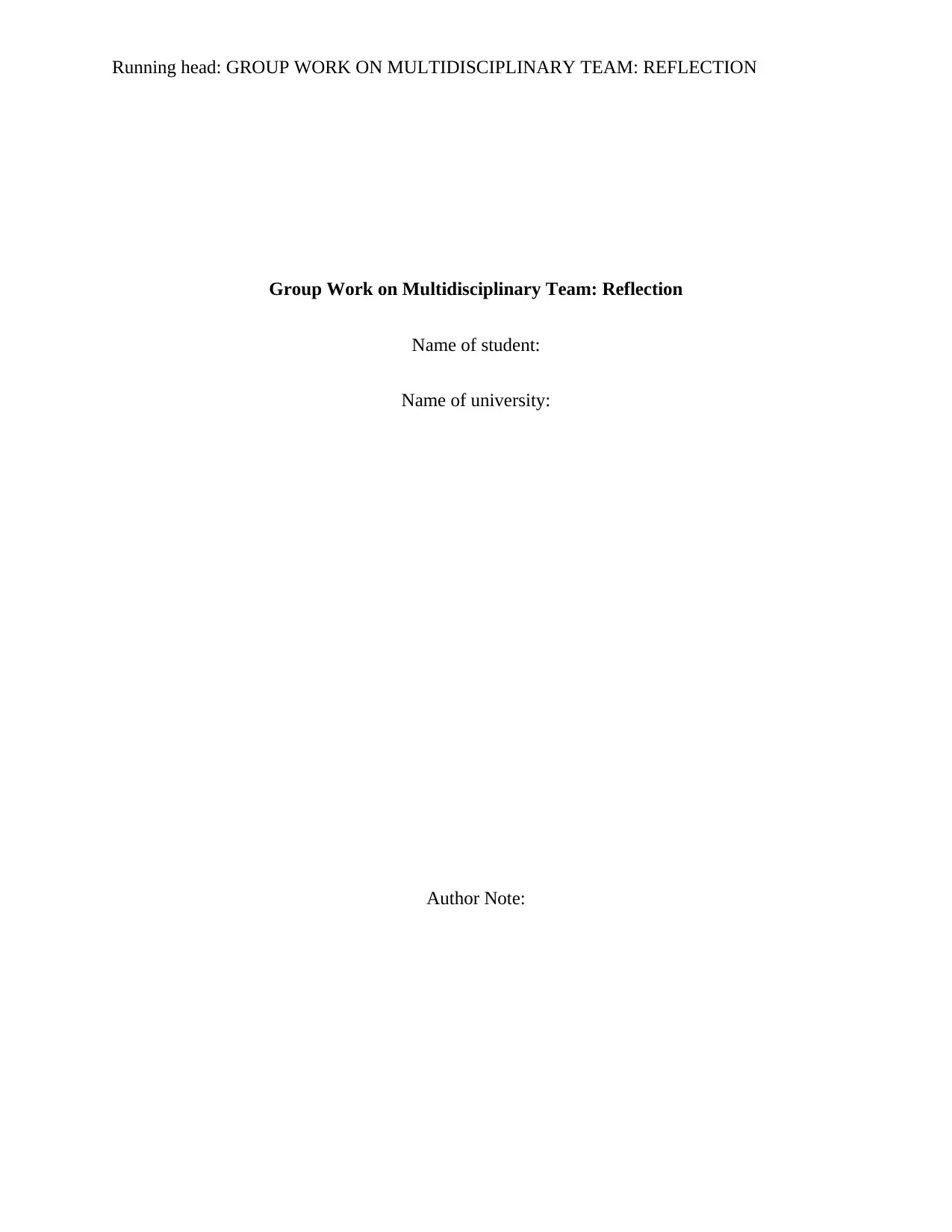
Running head: GROUP WORK ON MULTIDISCIPLINARY TEAM: REFLECTION
Group Work on Multidisciplinary Team: Reflection
Name of student:
Name of university:
Author Note:
Group Work on Multidisciplinary Team: Reflection
Name of student:
Name of university:
Author Note:
Paraphrase This Document
Need a fresh take? Get an instant paraphrase of this document with our AI Paraphraser
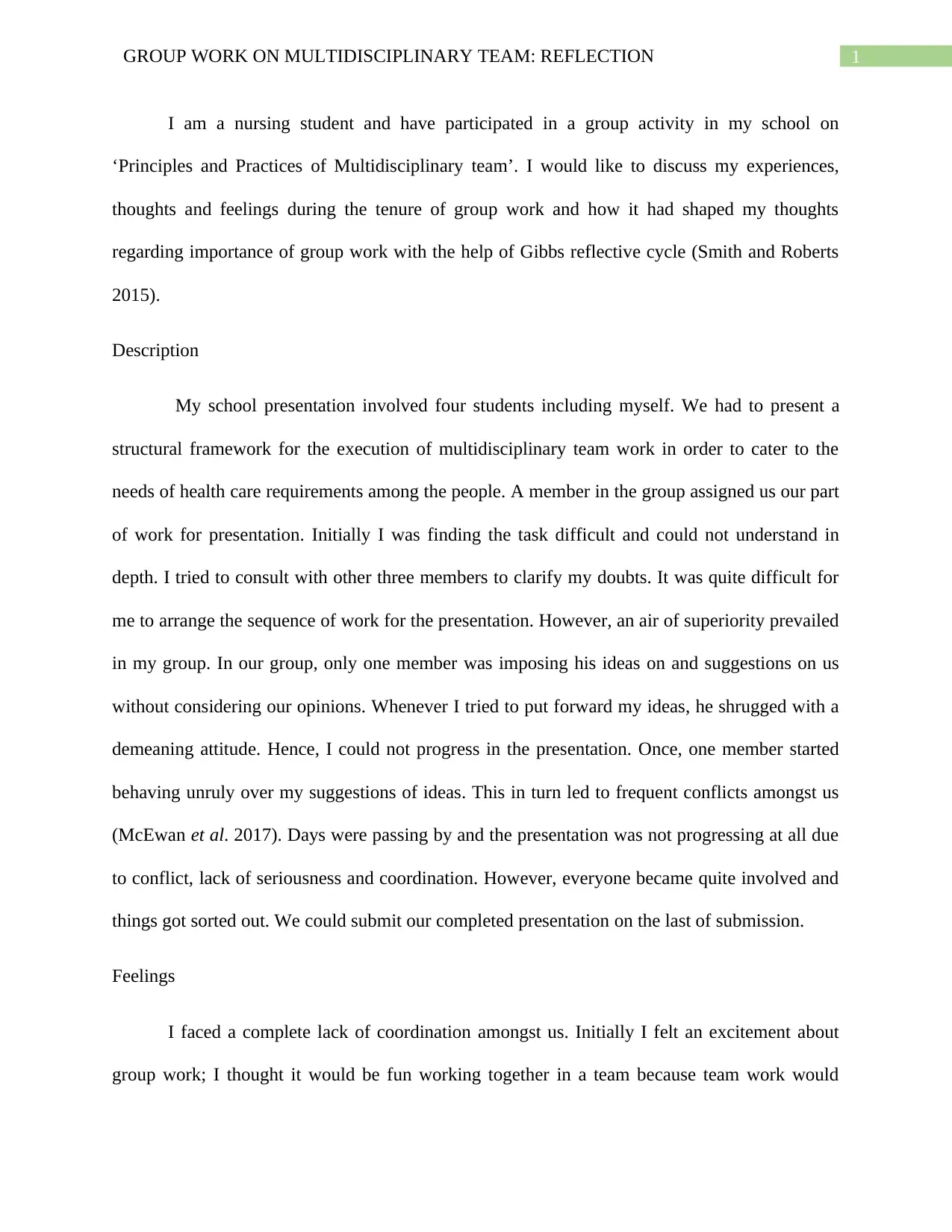
1GROUP WORK ON MULTIDISCIPLINARY TEAM: REFLECTION
I am a nursing student and have participated in a group activity in my school on
‘Principles and Practices of Multidisciplinary team’. I would like to discuss my experiences,
thoughts and feelings during the tenure of group work and how it had shaped my thoughts
regarding importance of group work with the help of Gibbs reflective cycle (Smith and Roberts
2015).
Description
My school presentation involved four students including myself. We had to present a
structural framework for the execution of multidisciplinary team work in order to cater to the
needs of health care requirements among the people. A member in the group assigned us our part
of work for presentation. Initially I was finding the task difficult and could not understand in
depth. I tried to consult with other three members to clarify my doubts. It was quite difficult for
me to arrange the sequence of work for the presentation. However, an air of superiority prevailed
in my group. In our group, only one member was imposing his ideas on and suggestions on us
without considering our opinions. Whenever I tried to put forward my ideas, he shrugged with a
demeaning attitude. Hence, I could not progress in the presentation. Once, one member started
behaving unruly over my suggestions of ideas. This in turn led to frequent conflicts amongst us
(McEwan et al. 2017). Days were passing by and the presentation was not progressing at all due
to conflict, lack of seriousness and coordination. However, everyone became quite involved and
things got sorted out. We could submit our completed presentation on the last of submission.
Feelings
I faced a complete lack of coordination amongst us. Initially I felt an excitement about
group work; I thought it would be fun working together in a team because team work would
I am a nursing student and have participated in a group activity in my school on
‘Principles and Practices of Multidisciplinary team’. I would like to discuss my experiences,
thoughts and feelings during the tenure of group work and how it had shaped my thoughts
regarding importance of group work with the help of Gibbs reflective cycle (Smith and Roberts
2015).
Description
My school presentation involved four students including myself. We had to present a
structural framework for the execution of multidisciplinary team work in order to cater to the
needs of health care requirements among the people. A member in the group assigned us our part
of work for presentation. Initially I was finding the task difficult and could not understand in
depth. I tried to consult with other three members to clarify my doubts. It was quite difficult for
me to arrange the sequence of work for the presentation. However, an air of superiority prevailed
in my group. In our group, only one member was imposing his ideas on and suggestions on us
without considering our opinions. Whenever I tried to put forward my ideas, he shrugged with a
demeaning attitude. Hence, I could not progress in the presentation. Once, one member started
behaving unruly over my suggestions of ideas. This in turn led to frequent conflicts amongst us
(McEwan et al. 2017). Days were passing by and the presentation was not progressing at all due
to conflict, lack of seriousness and coordination. However, everyone became quite involved and
things got sorted out. We could submit our completed presentation on the last of submission.
Feelings
I faced a complete lack of coordination amongst us. Initially I felt an excitement about
group work; I thought it would be fun working together in a team because team work would
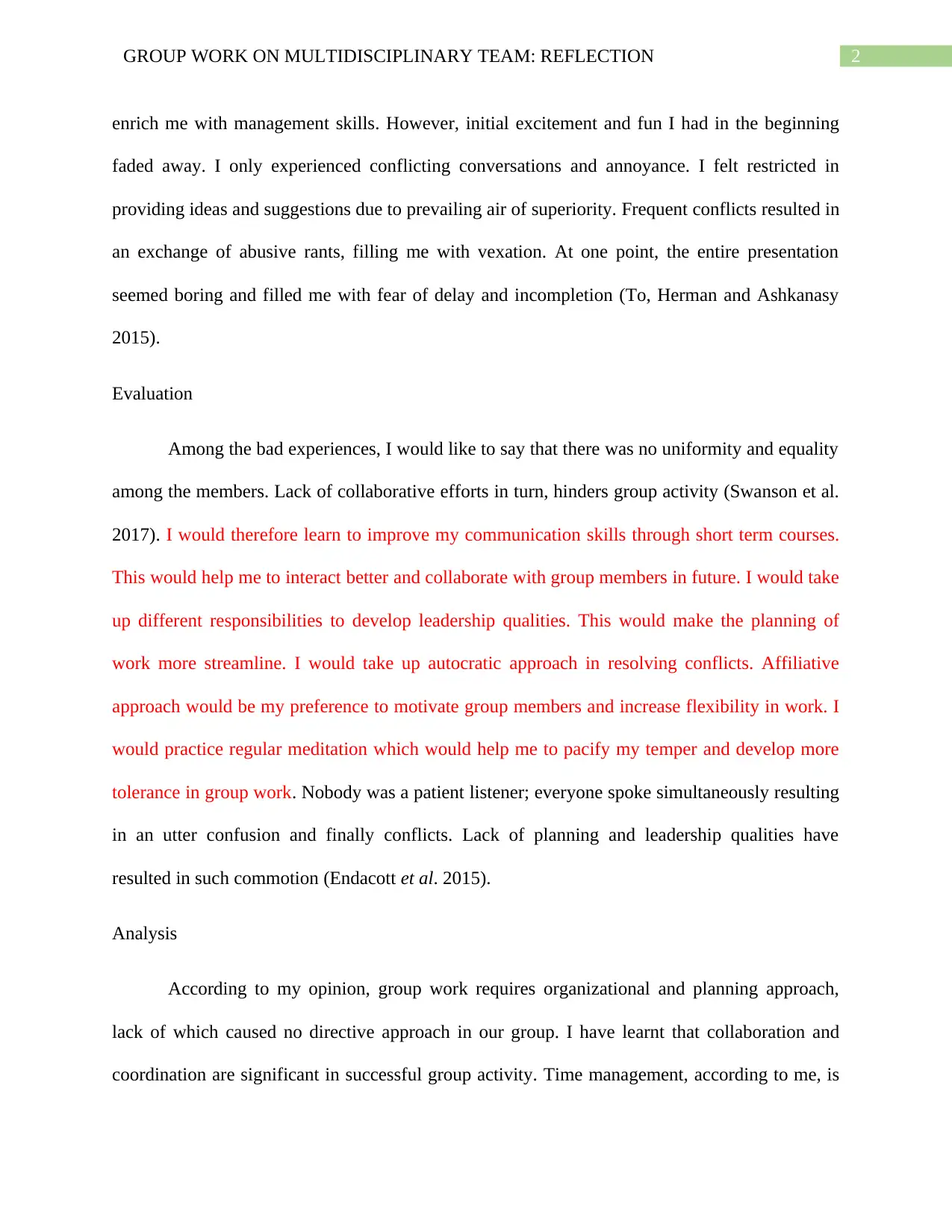
2GROUP WORK ON MULTIDISCIPLINARY TEAM: REFLECTION
enrich me with management skills. However, initial excitement and fun I had in the beginning
faded away. I only experienced conflicting conversations and annoyance. I felt restricted in
providing ideas and suggestions due to prevailing air of superiority. Frequent conflicts resulted in
an exchange of abusive rants, filling me with vexation. At one point, the entire presentation
seemed boring and filled me with fear of delay and incompletion (To, Herman and Ashkanasy
2015).
Evaluation
Among the bad experiences, I would like to say that there was no uniformity and equality
among the members. Lack of collaborative efforts in turn, hinders group activity (Swanson et al.
2017). I would therefore learn to improve my communication skills through short term courses.
This would help me to interact better and collaborate with group members in future. I would take
up different responsibilities to develop leadership qualities. This would make the planning of
work more streamline. I would take up autocratic approach in resolving conflicts. Affiliative
approach would be my preference to motivate group members and increase flexibility in work. I
would practice regular meditation which would help me to pacify my temper and develop more
tolerance in group work. Nobody was a patient listener; everyone spoke simultaneously resulting
in an utter confusion and finally conflicts. Lack of planning and leadership qualities have
resulted in such commotion (Endacott et al. 2015).
Analysis
According to my opinion, group work requires organizational and planning approach,
lack of which caused no directive approach in our group. I have learnt that collaboration and
coordination are significant in successful group activity. Time management, according to me, is
enrich me with management skills. However, initial excitement and fun I had in the beginning
faded away. I only experienced conflicting conversations and annoyance. I felt restricted in
providing ideas and suggestions due to prevailing air of superiority. Frequent conflicts resulted in
an exchange of abusive rants, filling me with vexation. At one point, the entire presentation
seemed boring and filled me with fear of delay and incompletion (To, Herman and Ashkanasy
2015).
Evaluation
Among the bad experiences, I would like to say that there was no uniformity and equality
among the members. Lack of collaborative efforts in turn, hinders group activity (Swanson et al.
2017). I would therefore learn to improve my communication skills through short term courses.
This would help me to interact better and collaborate with group members in future. I would take
up different responsibilities to develop leadership qualities. This would make the planning of
work more streamline. I would take up autocratic approach in resolving conflicts. Affiliative
approach would be my preference to motivate group members and increase flexibility in work. I
would practice regular meditation which would help me to pacify my temper and develop more
tolerance in group work. Nobody was a patient listener; everyone spoke simultaneously resulting
in an utter confusion and finally conflicts. Lack of planning and leadership qualities have
resulted in such commotion (Endacott et al. 2015).
Analysis
According to my opinion, group work requires organizational and planning approach,
lack of which caused no directive approach in our group. I have learnt that collaboration and
coordination are significant in successful group activity. Time management, according to me, is
⊘ This is a preview!⊘
Do you want full access?
Subscribe today to unlock all pages.

Trusted by 1+ million students worldwide
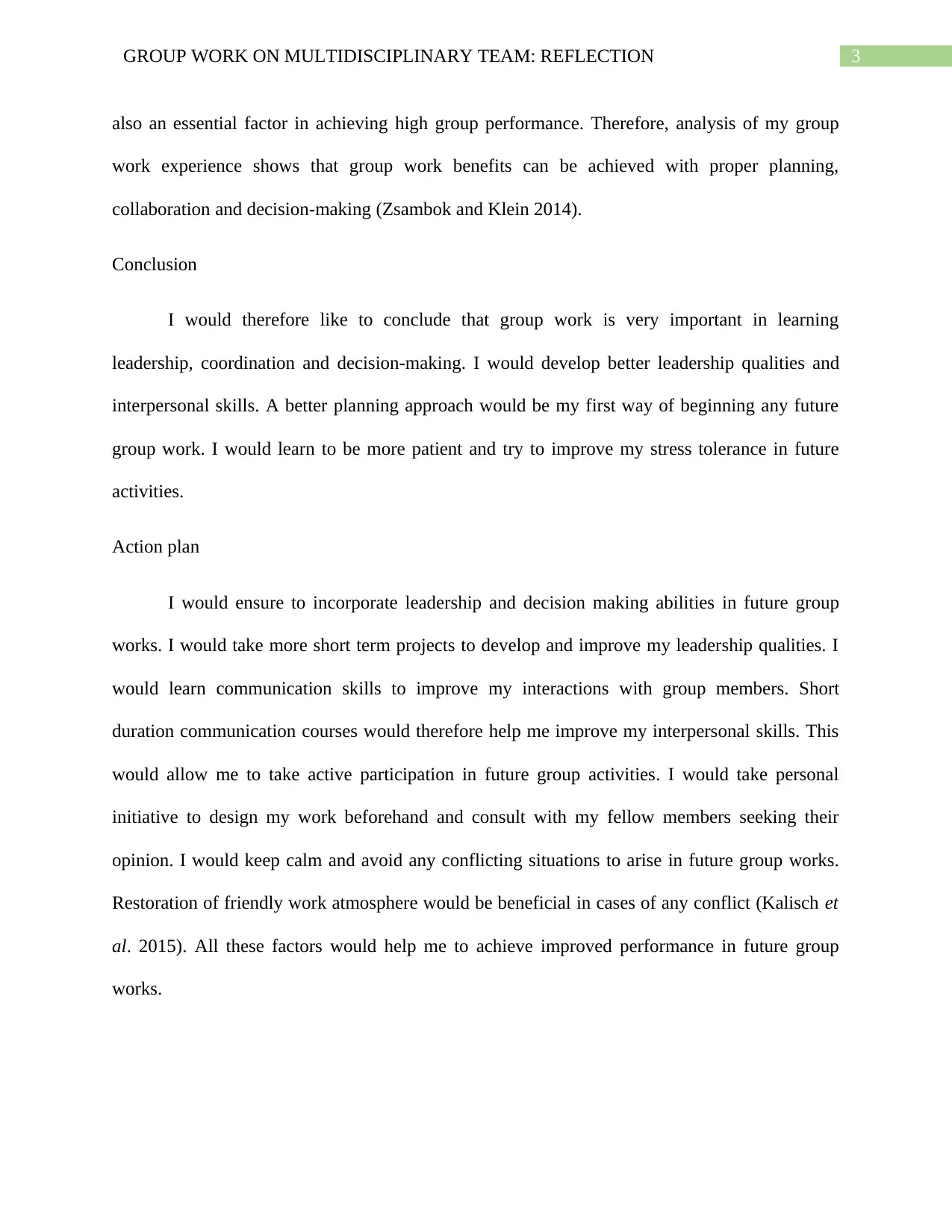
3GROUP WORK ON MULTIDISCIPLINARY TEAM: REFLECTION
also an essential factor in achieving high group performance. Therefore, analysis of my group
work experience shows that group work benefits can be achieved with proper planning,
collaboration and decision-making (Zsambok and Klein 2014).
Conclusion
I would therefore like to conclude that group work is very important in learning
leadership, coordination and decision-making. I would develop better leadership qualities and
interpersonal skills. A better planning approach would be my first way of beginning any future
group work. I would learn to be more patient and try to improve my stress tolerance in future
activities.
Action plan
I would ensure to incorporate leadership and decision making abilities in future group
works. I would take more short term projects to develop and improve my leadership qualities. I
would learn communication skills to improve my interactions with group members. Short
duration communication courses would therefore help me improve my interpersonal skills. This
would allow me to take active participation in future group activities. I would take personal
initiative to design my work beforehand and consult with my fellow members seeking their
opinion. I would keep calm and avoid any conflicting situations to arise in future group works.
Restoration of friendly work atmosphere would be beneficial in cases of any conflict (Kalisch et
al. 2015). All these factors would help me to achieve improved performance in future group
works.
also an essential factor in achieving high group performance. Therefore, analysis of my group
work experience shows that group work benefits can be achieved with proper planning,
collaboration and decision-making (Zsambok and Klein 2014).
Conclusion
I would therefore like to conclude that group work is very important in learning
leadership, coordination and decision-making. I would develop better leadership qualities and
interpersonal skills. A better planning approach would be my first way of beginning any future
group work. I would learn to be more patient and try to improve my stress tolerance in future
activities.
Action plan
I would ensure to incorporate leadership and decision making abilities in future group
works. I would take more short term projects to develop and improve my leadership qualities. I
would learn communication skills to improve my interactions with group members. Short
duration communication courses would therefore help me improve my interpersonal skills. This
would allow me to take active participation in future group activities. I would take personal
initiative to design my work beforehand and consult with my fellow members seeking their
opinion. I would keep calm and avoid any conflicting situations to arise in future group works.
Restoration of friendly work atmosphere would be beneficial in cases of any conflict (Kalisch et
al. 2015). All these factors would help me to achieve improved performance in future group
works.
Paraphrase This Document
Need a fresh take? Get an instant paraphrase of this document with our AI Paraphraser

4GROUP WORK ON MULTIDISCIPLINARY TEAM: REFLECTION
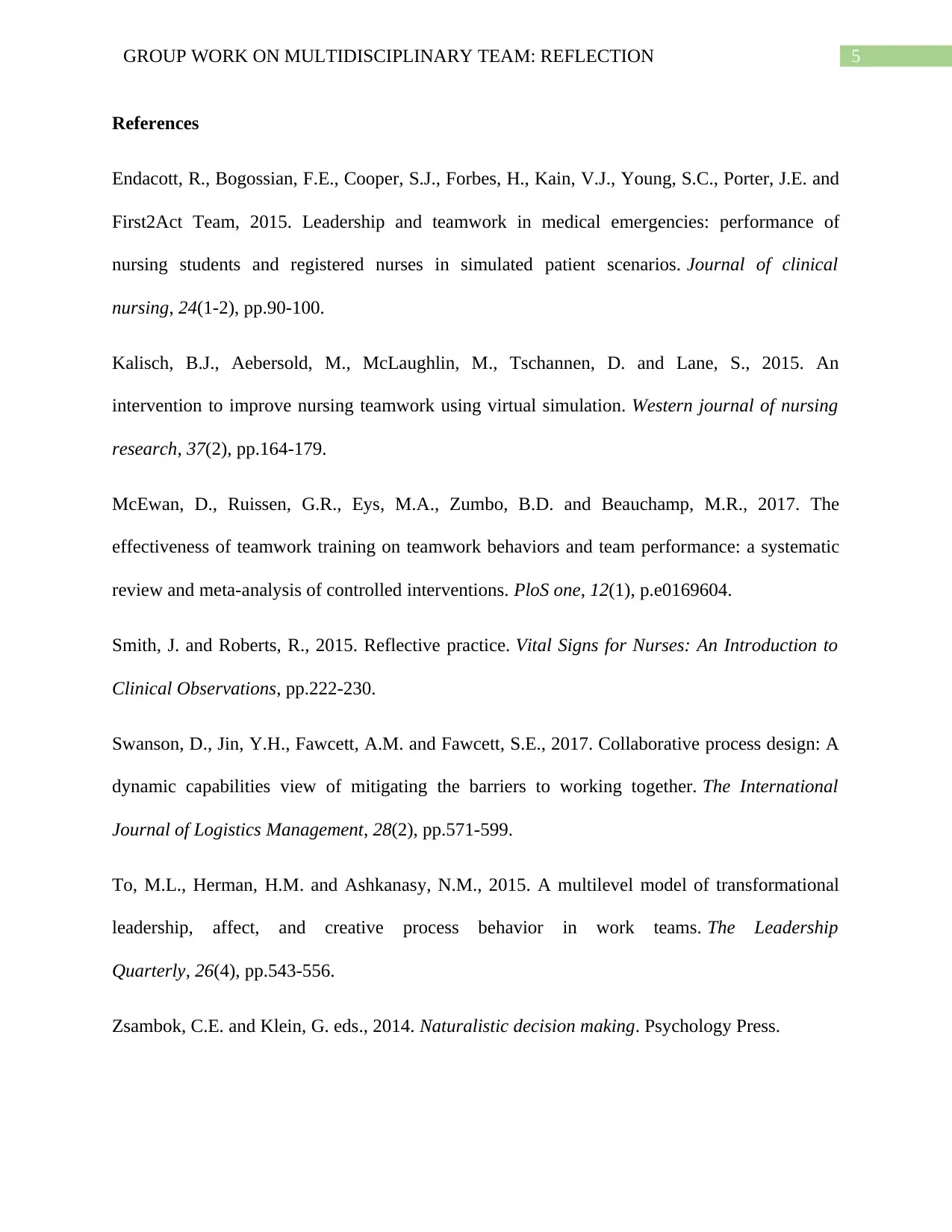
5GROUP WORK ON MULTIDISCIPLINARY TEAM: REFLECTION
References
Endacott, R., Bogossian, F.E., Cooper, S.J., Forbes, H., Kain, V.J., Young, S.C., Porter, J.E. and
First2Act Team, 2015. Leadership and teamwork in medical emergencies: performance of
nursing students and registered nurses in simulated patient scenarios. Journal of clinical
nursing, 24(1-2), pp.90-100.
Kalisch, B.J., Aebersold, M., McLaughlin, M., Tschannen, D. and Lane, S., 2015. An
intervention to improve nursing teamwork using virtual simulation. Western journal of nursing
research, 37(2), pp.164-179.
McEwan, D., Ruissen, G.R., Eys, M.A., Zumbo, B.D. and Beauchamp, M.R., 2017. The
effectiveness of teamwork training on teamwork behaviors and team performance: a systematic
review and meta-analysis of controlled interventions. PloS one, 12(1), p.e0169604.
Smith, J. and Roberts, R., 2015. Reflective practice. Vital Signs for Nurses: An Introduction to
Clinical Observations, pp.222-230.
Swanson, D., Jin, Y.H., Fawcett, A.M. and Fawcett, S.E., 2017. Collaborative process design: A
dynamic capabilities view of mitigating the barriers to working together. The International
Journal of Logistics Management, 28(2), pp.571-599.
To, M.L., Herman, H.M. and Ashkanasy, N.M., 2015. A multilevel model of transformational
leadership, affect, and creative process behavior in work teams. The Leadership
Quarterly, 26(4), pp.543-556.
Zsambok, C.E. and Klein, G. eds., 2014. Naturalistic decision making. Psychology Press.
References
Endacott, R., Bogossian, F.E., Cooper, S.J., Forbes, H., Kain, V.J., Young, S.C., Porter, J.E. and
First2Act Team, 2015. Leadership and teamwork in medical emergencies: performance of
nursing students and registered nurses in simulated patient scenarios. Journal of clinical
nursing, 24(1-2), pp.90-100.
Kalisch, B.J., Aebersold, M., McLaughlin, M., Tschannen, D. and Lane, S., 2015. An
intervention to improve nursing teamwork using virtual simulation. Western journal of nursing
research, 37(2), pp.164-179.
McEwan, D., Ruissen, G.R., Eys, M.A., Zumbo, B.D. and Beauchamp, M.R., 2017. The
effectiveness of teamwork training on teamwork behaviors and team performance: a systematic
review and meta-analysis of controlled interventions. PloS one, 12(1), p.e0169604.
Smith, J. and Roberts, R., 2015. Reflective practice. Vital Signs for Nurses: An Introduction to
Clinical Observations, pp.222-230.
Swanson, D., Jin, Y.H., Fawcett, A.M. and Fawcett, S.E., 2017. Collaborative process design: A
dynamic capabilities view of mitigating the barriers to working together. The International
Journal of Logistics Management, 28(2), pp.571-599.
To, M.L., Herman, H.M. and Ashkanasy, N.M., 2015. A multilevel model of transformational
leadership, affect, and creative process behavior in work teams. The Leadership
Quarterly, 26(4), pp.543-556.
Zsambok, C.E. and Klein, G. eds., 2014. Naturalistic decision making. Psychology Press.
⊘ This is a preview!⊘
Do you want full access?
Subscribe today to unlock all pages.

Trusted by 1+ million students worldwide
1 out of 6
Related Documents
Your All-in-One AI-Powered Toolkit for Academic Success.
+13062052269
info@desklib.com
Available 24*7 on WhatsApp / Email
![[object Object]](/_next/static/media/star-bottom.7253800d.svg)
Unlock your academic potential
Copyright © 2020–2026 A2Z Services. All Rights Reserved. Developed and managed by ZUCOL.




